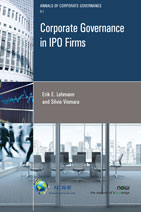Corporate Governance in IPO Firms
By Erik E. Lehmann, Universität Augsburg, Germany, erik.lehmann@wiwi.uni-augsburg.de | Silvio Vismara, University of Bergamo, Italy and Ghent University, Belgium, silvio.vismara@unibg.it
Abstract
An Initial Public Offering (IPO) is a crucial stage in the life of a firm since it allows the firm to emerge and grow. Corporate Governance, intended as the set of mechanisms and institutional designs that ensure that investors get a return on their investment, is a key aspect in the IPO since it ultimately affects its performance as well as the valuation given by the market. In this manuscript, we review the trajectory of the literature on corporate governance using a theoretical framework that distinguishes corporate governance mechanisms from market, authority and institutional mechanisms.
Corporate Governance in IPO Firms
Corporate Governance in IPO Firms encompasses theories and concepts analyzing, judging and describing financial decisions in entrepreneurial firms and draws on positive and normative aspects of entrepreneurship. In a positive way, this monograph describes these phenomena in aspects of governance issues in IPO firms, and why and how governance structures shape the behavior, the boundaries and the performance of these firms. In a normative way, this monograph offers concepts on how institutions and mechanisms should be designed and work to optimize a respective goal or performance associated with the IPO of an entrepreneurial firm.
Corporate governance mechanisms in IPO firms differ from the traditional corporate governance issues in several ways. First, an IPO confronts the founder-manager of the firm with the trade-off between obtaining additional resources to sustain future growth and profits and maintaining total control of the company. Secondly, this constitutes a trade-off for investors between the expected returns of a risky investment and the agency costs associated with moral hazard and adverse selection effects caused by imperfect and asymmetric information. Thirdly, analyzing IPOs offers insights into how these agency costs are priced by investors at the point in time that these costs occur. Fourthly, of difference is which governance mechanisms are at work at this initial stage of a company’s lifecycle. Finally, analyzing corporate governance issues in IPO’s offers additional insights on the macro level and reveals country-specific differences.
